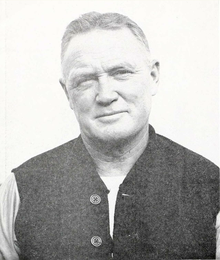 Drew from the 1949 "Corolla" | |
| Biographical details | |
|---|---|
| Born | November 9, 1894 Dyer Brook, Maine, U.S. |
| Died | October 20, 1979 (aged 84) Tuscaloosa, Alabama, U.S. |
| Playing career | |
| Football | |
| 1915 | Bates |
| 1916–1917 | Springfield |
| 1919 | Springfield |
| Coaching career (HC unless noted) | |
| Football | |
| 1921–1923 | Trinity (CT) |
| 1924–1927 | Birmingham–Southern |
| 1928 | Chattanooga (assistant) |
| 1929–1930 | Chattanooga |
| 1931–1941 | Alabama (assistant) |
| 1945 | Alabama (assistant) |
| 1946 | Ole Miss |
| 1947–1954 | Alabama |
| Basketball | |
| 1920–1924 | Trinity (CT) |
| 1924–1928 | Birmingham–Southern |
| 1928–1931 | Chattanooga |
| Head coaching record | |
| Overall | 96–68–14 (football) 77–86 (basketball) |
| Bowls | 1–2 |
| Accomplishments and honors | |
| Championships | |
| Football 1 SIAA (1929) 1 SEC (1953) | |
| Awards | |
| Football SEC Coach of the Year (1952) | |
Harold Delbert "Red" Drew (November 9, 1894 – October 20, 1979) was an American football, basketball, and track and field coach for over 40 years. He was the head coach of the Alabama Crimson Tide football team from 1947 to 1954, compiling a 54–28–7 record and leading the team to appearances in the Sugar, Orange and Cotton Bowls. He also served as an assistant football coach at Alabama from 1931 to 1941, including the undefeated 1934 team that won the national championship and played in the 1935 Rose Bowl. Drew also served as Alabama's track and field coach for 23 seasons continuing into the mid-1960s. He was inducted into the Alabama Sports Hall of Fame in 1971.
A native of Maine, Drew received degrees from Bates College in Maine and Springfield College in Massachusetts. He played football for both schools. He also played baseball and also competed as a pole vaulter at Bates College. His athletic career was interrupted by service as a naval aviator during World War I.
Drew began his coaching career as an athletic director, football coach, and basketball coach at Trinity College (1920–1924), Birmingham–Southern College (1924–1927) and the University of Chattanooga, now known as the University of Tennessee at Chattanooga (1927–1931). In 1931, he began his long association with the University of Alabama, serving as the head track coach and assistant football coach through the 1930s. He spent three years in the United States Navy during World War II and was placed in charge of "fleet recreation" on the island of Saipan. After the war, he served as the head coach of the Ole Miss Rebels football team in 1946.